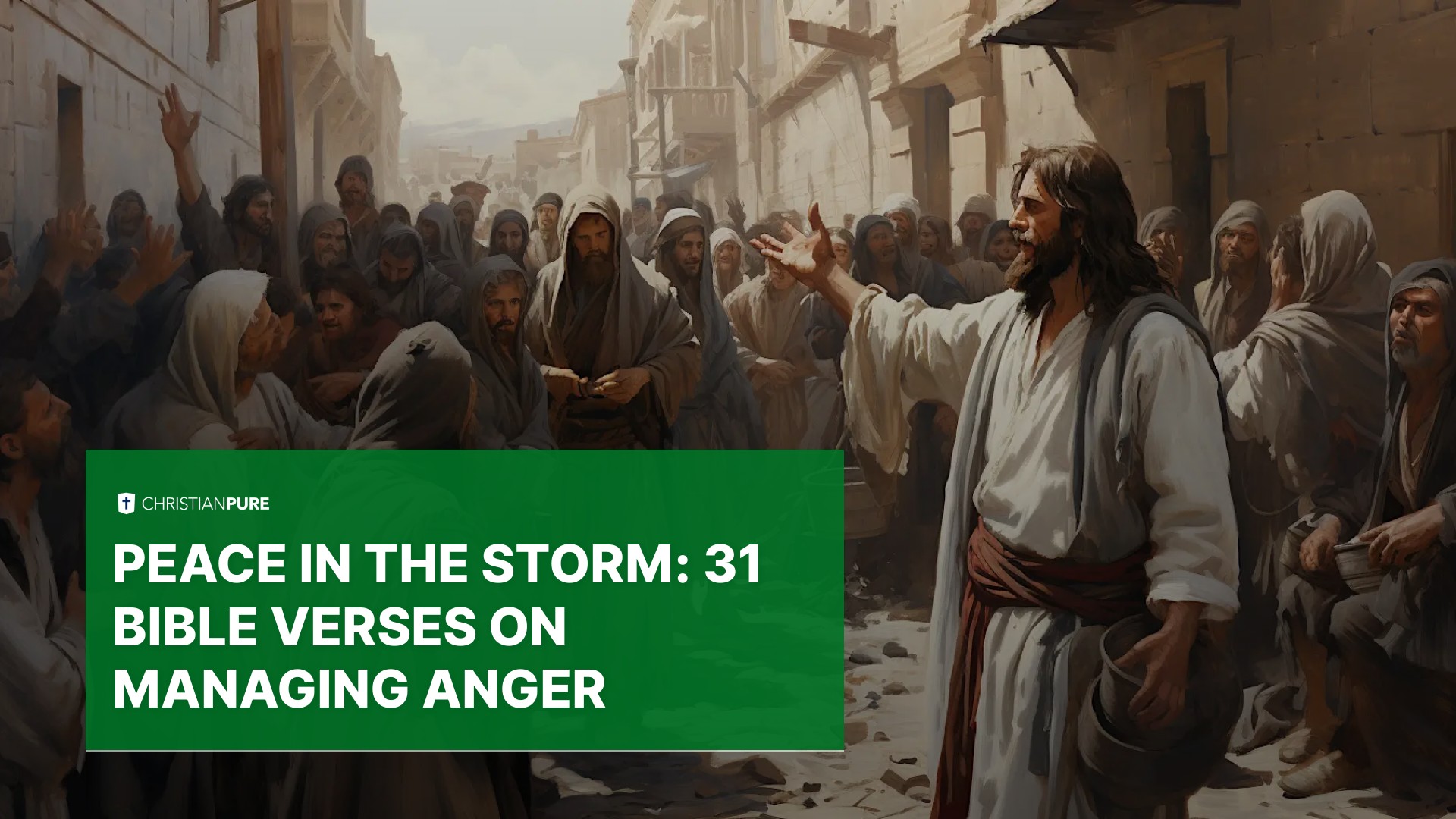Ephesians 4:26-27
"Be angry and do not sin; do not let the sun go down on your anger, and give no opportunity to the devil."
Reflection:This verse acknowledges that anger is a natural emotion but warns against letting it lead to sin. The call to resolve anger before the day ends emphasizes reconciliation and guarding against the destructive power of prolonged anger.
James 1:19-20
"Know this, my beloved brothers: let every person be quick to hear, slow to speak, slow to anger; for the anger of man does not produce the righteousness of God."
Reflection:This advises patience and listening over haste and anger, highlighting that human anger often diverts us from God's righteous path. It's a reminder of the importance of self-control and seeking understanding.
Proverbs 15:1
"A soft answer turns away wrath, but a harsh word stirs up anger."
Reflection:The wisdom here is in the power of gentle speech to diffuse conflict, suggesting that the way we respond can either escalate or calm down an angry situation.
Proverbs 14:29
"Whoever is slow to anger has great understanding, but he who has a hasty temper exalts folly."
Reflection:This verse extols the virtue of patience and understanding as a mark of wisdom, contrasting it with the foolishness of quick-tempered reactions.
Colossians 3:8
"But now you must put them all away: anger, wrath, malice, slander, and obscene talk from your mouth."
Reflection:Christians are called to live a new life in Christ, which includes shedding destructive emotions and behaviors, including anger, as part of personal transformation.
Proverbs 29:11
"A fool gives full vent to his spirit, but a wise man quietly holds it back."
Reflection:The distinction between foolishness and wisdom is made clear in the management of one's emotions. Wisdom involves self-control and discretion.
Matthew 5:22
"But I say to you that everyone who is angry with his brother will be liable to judgment; whoever insults his brother will be liable to the council; and whoever says, 'You fool!' will be liable to the hell of fire."
Reflection:Jesus intensifies the understanding of anger, linking it not just to actions but to the heart's attitude. It's a call to radical inner transformation and reconciliation.
Ecclesiastes 7:9
"Be not quick in your spirit to become angry, for anger lodges in the heart of fools."
Reflection:This verse warns against the ease with which we can become angry and how such a disposition is characteristic of foolishness, not wisdom.
Galatians 5:19-21
"Now the works of the flesh are evident: sexual immorality, impurity, sensuality, idolatry, sorcery, enmity, strife, jealousy, fits of anger, rivalries, dissensions, divisions, envy, drunkenness, orgies, and things like these. I warn you, as I warned you before, that those who do such things will not inherit the kingdom of God."
Reflection:Paul lists fits of anger among the behaviors that are contrary to living according to the Spirit. It's a stark reminder that uncontrolled anger can have spiritual consequences.
Proverbs 16:32
"Whoever is slow to anger is better than the mighty, and he who rules his spirit than he who takes a city."
Reflection: This verse elevates self-control above physical strength, suggesting that mastery over one's emotions is a greater achievement than military conquest.
Psalm 37:8
"Refrain from anger, and forsake wrath! Fret not yourself; it tends only to evil."
Reflection: The psalmist advises against indulging in anger and fretting, pointing out the destructive path they lead to. It's a call to trust in God instead of yielding to harmful emotions.
Ecclesiastes 7:9
"Do not be quickly provoked in your spirit, for anger resides in the lap of fools."
Reflection: Similar to its other mention, this verse emphasizes the folly in quickness to anger, advocating for a calm and composed spirit.
Titus 1:7
"For an overseer, as God's steward, must be above reproach. He must not be arrogant or quick-tempered or a drunkard or violent or greedy for gain."
Reflection: Leaders, in particular, are called to exhibit self-control and patience, setting an example for others in not succumbing to quick-tempered reactions.
Proverbs 22:24-25
"Make no friendship with a man given to anger, nor go with a wrathful man, lest you learn his ways and entangle yourself in a snare."
Reflection: This advice warns against the influence of associating with those who are prone to anger, highlighting the potential for adopting such negative traits.
Leviticus 19:17-18
"You shall not hate your brother in your heart, but you shall reason frankly with your neighbor, lest you incur sin because of him. You shall not take vengeance or bear a grudge against the sons of your own people, but you shall love your neighbor as yourself: I am the LORD."
Reflection: This Old Testament command emphasizes the importance of open communication and forgiveness, linking love for one's neighbor with obedience to God.
Ephesians 4:31
"Let all bitterness and wrath and anger and clamor and slander be put away from you, along with all malice."
Reflection: Christians are urged to rid themselves of not only anger but also of all forms of malice and bitterness, fostering a community of forgiveness and kindness.
2 Timothy 2:24-25
"And the Lord's servant must not be quarrelsome but kind to everyone, able to teach, patiently enduring evil, correcting his opponents with gentleness. God may perhaps grant them repentance leading to a knowledge of the truth."
Reflection: This passage outlines the demeanor expected of a servant of the Lord, emphasizing gentleness, patience, and the hopeful outcome of leading others to truth through kindness.
Proverbs 19:11
"Good sense makes one slow to anger, and it is his glory to overlook an offense."
Reflection: Overlooking an offense is portrayed not as weakness but as a noble choice, a mark of wisdom and maturity.
Proverbs 15:18
"A hot-tempered man stirs up strife, but he who is slow to anger quiets contention."
Reflection: The contrast between the effects of hot-temperedness and patience on conflict resolution is highlighted, valuing the peace-making quality of patience.
Matthew 21:12-13
"And Jesus entered the temple and drove out all who sold and bought in the temple, and he overturned the tables of the money-changers and the seats of those who sold pigeons. He said to them, 'It is written, "My house shall be called a house of prayer," but you make it a den of robbers.'"
Reflection: This instance of Jesus' anger is directed against corruption and the desecration of sacred space, illustrating that there are righteous reasons for anger, particularly in defense of justice and holiness.
Proverbs 20:3
"It is an honor for a man to keep aloof from strife, but every fool will be quarreling."
Reflection: Avoiding unnecessary conflict is seen as honorable, contrasting with the folly of engaging in constant quarrels.
Proverbs 17:14
"The beginning of strife is like letting out water, so quit before the quarrel breaks out."
Reflection: This metaphor warns of the escalating nature of conflict, advising caution and withdrawal before disputes intensify.
Proverbs 27:4
"Wrath is cruel, anger is overwhelming, but who can stand before jealousy?"
Reflection: The destructive capacity of anger and jealousy is acknowledged, suggesting that these emotions can surpass even physical cruelty in their impact.
Romans 12:19
"Beloved, never avenge yourselves, but leave it to the wrath of God, for it is written, 'Vengeance is mine, I will repay, says the Lord.'"
Reflection: This verse instructs believers to refrain from personal vengeance, trusting in God's justice to prevail in His timing.
Proverbs 30:33
"For pressing milk produces curds, pressing the nose produces blood, and pressing anger produces strife."
Reflection: The natural consequences of provoking anger are likened to physical reactions, illustrating the inevitability of conflict following unchecked anger.
1 Peter 2:23
"When he was reviled, he did not revile in return; when he suffered, he did not threaten, but continued entrusting himself to him who judges justly."
Reflection: Christ's example of responding to injustice and suffering without retaliation or anger serves as a model for believers, emphasizing trust in God's justice.
Proverbs 21:19
"It is better to live in a desert land than with a quarrelsome and fretful woman."
Reflection: This proverb humorously underscores the discomfort of living in constant contention, valuing peace over conflict.
Proverbs 18:19
"A brother offended is more unyielding than a strong city, and quarreling is like the bars of a castle."
Reflection: The deep divide that quarrels can create is likened to the defenses of a city, suggesting that reconciliation can be as challenging as conquering a fortified city.
Proverbs 25:28
"A man without self-control is like a city broken into and left without walls."
Reflection: The lack of self-control, particularly in anger, is compared to a defenseless city, highlighting the vulnerability and chaos that ensue.
Proverbs 15:18 (repeated for emphasis)
”A hot-tempered man stirs up strife, but he who is slow to anger quiets contention."
Reflection: Reiterating the value of patience and its role in maintaining peace and preventing conflict.
Psalm 4:4
"Be angry, and do not sin; ponder in your own hearts on your beds, and be silent. Selah"
Reflection: This verse invites introspection in the face of anger, advocating for a reflective pause instead of immediate action, aligning with the admonition in Ephesians 4:26.
These reflections offer a glimpse into the complex and nuanced Christian understanding of anger, emphasizing self-control, reconciliation, and the pursuit of righteousness as key themes in managing anger.





















